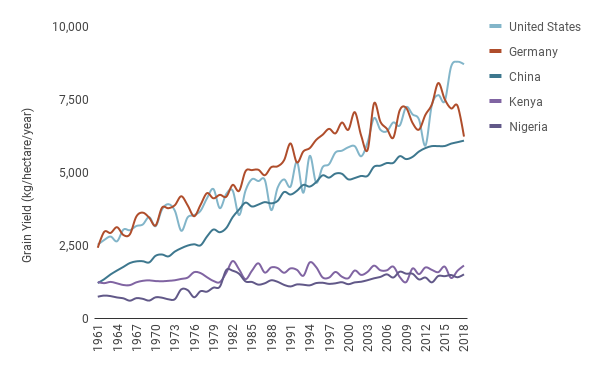|
I just saw the recent Gates Foundation announcement for new grants issued and 2 of 3 are related to training farmers! This is horrible. You might think: How can I be against training Farmers? I am not against the training. I'm against spending the majority of development money on something which actually doesn't deliver value for the farmers. And is actually harmful TO THE FARMERS. Let's dig into these grant awards from the Gates Foundation in detail: the first is a marketplace for goat vets. In theory, this Marketplace will educate Farmers on the different illnesses a goat could have and connect the farmer with a vet who can solve their problem. It's like an Uber or Airbnb for goat vets. But there's two big problems here. One, Uber for goat vets is never going to work as a sustainable business. Why? The GoatVets platform will be disintermediated. Marketplaces only work when you have to interact with a different seller each time. Every Uber I get is a different driver. Every Airbnb I visit has a different host. Every product I buy on eBay is from a different seller. GoatVet will be disintermediated because once Farmers get matched with a vet once they won't go through the platform anymore. Why would they pay marketplace fees when they already know the vet? This goat platform won't make any money and it won't be sustainable. And if it’s not going to be sustainable, why fund it? It’s going to be a money pit if donors do try to prop it up. Mark my words. Okay fine, GoatVet is unlikely to work but that’s how innovation is, right? That brings us to the second point. GoatVet is specifically looking at training Farmers instead of helping Farmers increase their income. This is the problem with all farmer training and why I am so against this. The problem is not that farmers don't know; it’s that they've no place to sell their goods for a fair price. Shouldn’t this be obvious to grantors? Farmers can’t make more money if they can’t sell more products for a better price. This is basic mathematics: Revenue = #products_sold x $price_per_product (Note that this equation is number of products SOLD, not number of products PRODUCED. Farmer training, in theory, increases number of products produced. What we need to do is help farmers sell MORE products and/or for a HIGHER price.) Let’s step back for a second and give some context for what happens on a farm. Farmers all harvest/slaughter their goats at the same time because they plan according to the seasons. This means there's a glut in the Market at one time. The poorest farmers sell when the prices are low. They have no way to preserve their food. The goat meat (or tomatoes or whatever) is going to rot if they don't sell them right away. Then because of poor market linkages there's many middlemen before it actually gets to an end consumer. And because of poor government policy and onerous laws that should be repealed, it's virtually impossible for a smallholder farmer to sell their own produce at scale or export it. There is no way for a small scale farmer to deal with the bureaucracy of aggregation and export. And THAT is what grantors should be solving. Let's go back to the goat farmers. If they have good meat what refrigerator exactly or freezer will they put their goat meat into? What about their goat milk? There's all kinds of government regulations which prevent Farmers from aggregating their milk and selling in supermarkets where they could actually make money. All the money that is spent on Farmer training should be spent on helping Farmers sell their product. If this grant was for something that helps Farmers get their product to customers then we might have something. At first Farmers could sell on the local market. Then once they become competitive they might even be able to export at a premium price. But that's not what this grant is for. But it gets worse. If you train Farmers to produce better products then they will hopefully produce more of it. Yay. But now what? Now all of their neighbors are producing more of that product. Now they have more competition. Supply and demand. This is basic economics. If people produce more goat meat and there's no way to transport to market then the price of goat meat will go down. Farmers might even make a loss. Let's look at another Grant funded by the Gates Foundation. This one for Equity Bank where they're creating an integrated digital platform, EquiFarm. It sounds a whole lot like Safaricom’s collapsing DigiFarm platform. And countless other farm apps in the graveyard like m-farm. The idea is that Farmers will get tips on farming and buy insurance products. Why is a bank teaching Farmers how to farm? Why would Equity Bank, in a centralized way, understand what Farmers need in very different parts of the country with very different growing conditions? Why are we insuring Farmers instead of increasing their income? So why do grantors do this? Well if you look at the data you see that in developing countries Farmers are far less productive than developed countries. Like 5x less. Source: World Bank
And this is even though developing countries near the equator get about twice as much Sunshine as farms in North America or Europe. So the grantors say “if only we could increase yield then all farmers in Africa will be rich!” If only it were so easy! You can't just plug numbers into Excel and magically increase farmer income. If you don't improve the supply chain to market you don't increase sales and you're doing nothing. And possibly making it worse. All the time Farmers spend in training learning "Innovative Smart Systems" (lol) is time wasted they could be farming. Or watching TV. Or drinking a beer which frankly would be a better use of their time. At least if they drink a beer at the bar they might meet someone who can buy their crops. So why do Grantors keep doing this? The reason is that they're afraid to fund Capital Expenditures like processing equipment that can make farm products shelf-stable. To increase sales for farmers you need to somehow preserve their products such that when they pick their tomatoes they don't all rot at the same time. You need to make tomato sauce. With your mangoes make dried mangoes. With your goat you need to make goat sausage. With your french beans refrigerate them. But here's the thing. In order to do that, in order to have any storable, value-added products, you need to have factories. And factories need CapEx. And granters are allergic to CapEx. (I should pause for a moment and say that not ALL grantors are against CapEx. I have worked with some very fine grantors who bravely went to their board to advocate for companies I work with to spend on CapEx. And they were successful. So I know there is hope for grantors to change and make better funding decisions.) Why are grantors generally allergic to CapEx? Because at the end of the grant program some poor entrepreneur could decide to sell the equipment and actually make money. Get a backbone! If you want to solve The World's problems is not going to be easy. You're going to have to go to your board and tell them that CapEx needs to be funded in order to create value-added products in order to increase income for farmers. Otherwise, it's a waste of time and a waste of breath. And it's a waste of grant money so grantors should care as well. Is farmer training EVER useful? Sure, but that's when (and only when) the market is buying so much produce that farmers can't keep up. And even then a little training goes a long way. We don’t need broad-based training for everything. For any given crop under specific conditions of a Farm there are one or two bottlenecks that need to be addressed; the training needs to be extremely targeted. Further, there are far more cost effective ways to train farmers. Look at the Ugandan YouTube channel Farm Up where one guy posts videos getting close to 0.5m views each. Surely this wouldn’t cost more than $100,000. Or Shamba Shape Up TV show where you can reach 9m farmers per week for around $10,000. Meanwhile, EquiFarm training app will only reach 200,000 farmers initially. They claim they will reach 2m at scale (which I’m skeptical of) and will cost Gates Foundation around ~$1.5m. Really? C’mon people. What happened to being data-driven? What makes this even sadder is that Gates Foundation is usually considered one of the “smart money” grantors. So let's stop this Insanity. Stop training farmers. Instead, help farmers increase their income. Finance the creation of value-added products. Pay for the CapEx needed to get these projects off the ground. Stop training farmers. Please.
6 Comments
12/14/2021 12:48:18 am
Value addition and reduction in wastage from the farms is the only way to help African farmers.
Reply
Kyle Schutter
12/15/2021 04:17:01 pm
Rwathia, thanks for reading. Totally agree. From what I understand you are working on value addition yourself. Keep up the good work! You're on the right path. 😀
Reply
6/27/2022 10:03:06 pm
Spot on, not so many people see through the value addition lenses.
Reply
Kennedy
4/29/2022 11:13:14 pm
Great insights there. Grantors need to concentrate on agro-processing and market linkage to expand the industry
Reply
Leave a Reply. |
AuthorKyle founded Grant&Co after running a biogas company in Kenya for 5 years. We raised a lot of grant capital there. And now we help other entrepreneurs raise capital. Archives
November 2022
Categories |


 RSS Feed
RSS Feed